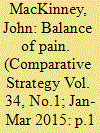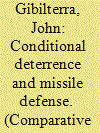|
|
|
Sort Order |
|
|
|
Items / Page
|
|
|
|
|
|
|
| Srl | Item |
| 1 |
ID:
137276


|
|
|
|
|
| Summary/Abstract |
More than any other modern nation, Israel has combatted, prevented, countered, and deterred terrorist attacks. While the conflict that spawns terrorism did not begin with the founding of modern Israel, its establishment by United Nations resolution in 1948 has certainly become the contemporary trigger point for this ancient antipathy. Israel has attempted different tactical and strategic approaches to halt attacks, including deterrence, but, in contrast to what U.S. strategists might initially suppose from their Cold War experience, Israeli deterrence of terrorism does not fall into either the Kahn or Schelling schools of thought. It has more affinity to risk management, and kinship with deterrence of crime in a civil legal system. Like criminal law enforcement, the expectation of Israeli terror deterrence is not unrealistically zero attacks, but practical management to maintain a certain status quo. Israel, however, appears trapped in an endless cycle of pain with its adversaries, a cycle regulated by unspoken rules. This article evaluates the Israeli experience in terrorism deterrence, and concludes with observations concerning efforts to protect the U.S. homeland.
|
|
|
|
|
|
|
|
|
|
|
|
|
|
|
|
| 2 |
ID:
137279


|
|
|
|
|
| Summary/Abstract |
The traditional view of ballistic missile defense is that defensive weapons are destabilizing. This article explains why the more broadly and traditionally accepted classical approach to deterrence is flawed and demonstrates the greater explanatory power and implications of conditional deterrence based on power parity theory. Given the implications that can be drawn from conditional deterrence, this article demonstrates that limited efforts at developing and deploying missile defenses enhance deterrence and reduce the ballistic missile threat in the short term and may also discourage the proliferation of ballistic missiles and weapons of mass destruction.
|
|
|
|
|
|
|
|
|
|
|
|
|
|
|
|
| 3 |
ID:
137277


|
|
|
|
|
| Summary/Abstract |
When they present themselves, crises in the international order tend to threaten status quo norms, typically demand some urgency of response, and always pose a degree of uncertainty of outcome to those who face them. Yet, crises, and the need to face them, is an inevitable feature of the so-called “human condition.” Embedded within that condition are psychological and physiological aspects that can (and do) impact how effectively crises are managed when leaders are pressed for solutions. This is true regardless of leadership form, whether autocratic or democratic. This article examines how the ill effects of stress, emotion, and human tendency manifest themselves during crisis situations, and how their presence can negatively weigh upon crisis decision-making. In doing so, it draws from several examples found in the historical record to show how leader character seems to play a crucial, if not defining, role in either the success or failure of crisis management in international affairs.
|
|
|
|
|
|
|
|
|
|
|
|
|
|
|
|
| 4 |
ID:
137280


|
|
|
|
|
| Summary/Abstract |
It has become increasingly difficult to ascertain the value of NATO for its member states, necessitating an honest conversion debate as to the alliance's future. The article analyses why NATO is becoming extraneous by reviewing NATO's role in Afghanistan and Libya, the emerging threats to the Euro-zone, and the development of a European Union's Common Foreign and Defense Policy, which is understood as laying the framework for an EU strategic culture. The final section offers some suggestions on how NATO can continue to play a role in international relations with its maritime component.
|
|
|
|
|
|
|
|
|
|
|
|
|
|
|
|
| 5 |
ID:
137281


|
|
|
|
|
| Summary/Abstract |
This study inquires whether the United States and Russia might be headed toward a new Cold War, at least with respect to certain aspects of their diplomatic-strategic behavior. Those aspects have to do with missile defenses, nuclear arms control, and conflict in cyberspace. Arguments pertinent to these three domains or issues are not necessarily transferable, as interpretations of trends in U.S.-Russian relations, to other aspects of their diplomacy and national security affairs. For example, one cannot necessarily infer the outcome of Russian-American relations over Syria, Ukraine, or Afghanistan based on prevailing tendencies in nuclear arms control or cyber war. Nevertheless, the examination of missile defenses, nuclear arms control, and cyber conflict may yield important insights about near- and longer term prospects, because: (1) each of these issues has been identified by both states as a matter of vital national security interest; (2), each issue offers a challenging mix of technical judgments and policy prescriptions; and (3) U.S.-Russian cooperation is a necessary condition for amelioration of the security risks in each of these issue domains, as well as in their possible areas of overlap.
|
|
|
|
|
|
|
|
|
|
|
|
|
|
|
|
| 6 |
ID:
137278


|
|
|
|
|
| Summary/Abstract |
The Khan network provided nuclear technology and assistance to at least four state nuclear programs over the course of three decades. This network was neither static nor a singular entity. Rather, it was a loose collection of actors whose methods evolved in response to a changing world. By the late 1990s, the Khan network was relying on ever increasing levels of subterfuge to procure machine tools from the West while cultivating new locales for the manufacture of centrifuge parts. The trajectory of the network's procurement methods suggests that current supply-side controls are not adequate to block a determined state proliferator.
|
|
|
|
|
|
|
|
|
|
|
|
|
|
|
|
|
|
|
|
|